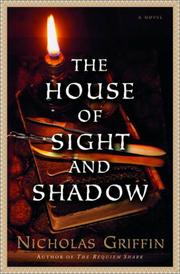

THE HOUSE OF SIGHT AND SHADOW
by Nicholas Griffin
Images of Hogarth’s Gin Lane and Fielding’s Inns of Court arise from this densely atmospheric historical tale, the second from the young English-born author of The Requiem Shark (2000).
A potentially good novel lies within it, somewhere between two narratives of unequal interest and uncertain interrelationship. The first, and better, traces the dark doings of eminent London anatomist (and former surgeon) Sir Edmund Cathcart and his student and apprentice Joseph Bendix, fresh from a Parisian education in both medicine and l’amour. Griffin persuasively characterizes both men as credible mixtures of scientific integrity and intellectual arrogance and heightens interest in their researches (which, predictably, require clandestine purchases of fresh corpses) by adding to the mix the historical figures of novelist-pamphleteer (and ultimate London insider) Daniel Defoe and such notorious malefactors as brigand Jack Sheppard and Jonathan Wild, who’s both master criminal and “Thief Taker” for hire (“Useful and perhaps the vilest man in London”). So far so good—until Griffin shifts the focus to Bendix’s fascination with his mentor’s closeted daughter Amelia, an albino beauty whose skin “blisters” in the sun and whose blindness motivates her father’s amoral pursuit of the medical knowledge that may enable him to restore her sight and give her normal health. A little past the midway point here, Joseph’s courtship of, and later (sexless) marriage to, the fragile Amelia takes center stage—and much of the story’s energy drains away, leaving it as bloodless as its passive (in fact, really rather tiresome) heroine. This despite a flurry of carefully staged surprise twists that clutter the novel’s repeatedly delayed climax (following some inexcusably overextended authorial foreplay).
Griffin’s House is drenched in foggy, gaslit, garbage-strewn detail (not to mention several heavy echoes of A Tale of Two Cities), but it fails to live up to the viscerally dramatic promise of its yeasty opening chapters. Disappointing.